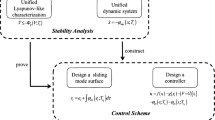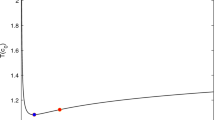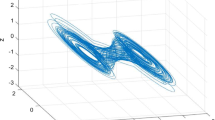Abstract
This paper investigates the adaptive event-triggered control problem for a class of nonlinear systems subject to periodic disturbances. To reduce the communication burden, a reliable relative threshold strategy is proposed. Fourier series expansion and radial basis function neural network are combined into a function approximator to model suitable time-varying disturbed function of known periods in strict-feedback systems. By combining the Lyapunov stability theory and the backstepping technique, the proposed adaptive control approach ensures that all the signals in the closed-loop system are bounded, and the tracking error can be regulated to a compact set around zero in finite time. Finally, simulation results are presented to verify the effectiveness of the theoretical results.
Similar content being viewed by others
References
Ge S S, Wang J. Robust adaptive tracking for time-varying uncertain nonlinear systems with unknown control coefficients. IEEE Trans Automat Contr, 2003, 48: 1463–1469
Song Y D, Huang X C, Wen C Y. Robust adaptive fault-tolerant PID control of MIMO nonlinear systems with unknown control direction. IEEE Trans Ind Electron, 2017, 64: 4876–4884
Xu J J, Xu L, Xie L H, et al. Decentralized control for linear systems with multiple input channels. Sci China Inf Sci, 2019, 62: 052202
Zhu Y, Zheng W X. Multiple Lyapunov functions analysis approach for discrete-time switched piecewise-affine systems under dwell-time constraints. IEEE Trans Autom Control, 2019. doi: 10.1109/TAC.2019.2938302
Wei Q L, Liu D R, Lin Q, et al. Adaptive dynamic programming for discrete-time zero-sum games. IEEE Trans Neural Netw Learn Syst, 2018, 29: 957–969
Li H Y, Wang Y Y, Yao D Y, et al. A sliding mode approach to stabilization of nonlinear Markovian jump singularly perturbed systems. Automatica, 2018, 97: 404–413
Ding L, Han Q L, Wang L Y, et al. Distributed cooperative optimal control of DC microgrids with communication delays. IEEE Trans Ind Inf, 2018, 14: 3924–3935
Lin Z L. Control design in the presence of actuator saturation: from individual systems to multi-agent systems. Sci China Inf Sci, 2019, 62: 026201
Lu Z H, Zhang L, Wang L. Controllability analysis of multi-agent systems with switching topology over finite fields. Sci China Inf Sci, 2019, 62: 012201
Ren H, Karimi H R, Lu R, et al. Synchronization of network systems via aperiodic sampled-data control with constant delay and application to unmanned ground vehicles. IEEE Trans Ind Electron, 2019. doi: 10.1109/TIE.2019.2928241
Zheng C, Li L, Wang L Y, et al. How much information is needed in quantized nonlinear control? Sci China Inf Sci, 2018, 61: 092205
Zhang D, Han Q L, Zhang X M. Network-based modeling and proportional-integral control for direct-drive-wheel systems in wireless network environments. IEEE Trans Cybern, 2019. doi: 10.1109/TCYB.2019.2924450
He W, Dong Y T. Adaptive fuzzy neural network control for a constrained robot using impedance learning. IEEE Trans Neural Netw Learn Syst, 2018, 29: 1174–1186
Zhou Q, Li H Y, Wang L J, et al. Prescribed performance observer-based adaptive fuzzy control for nonstrict-feedback stochastic nonlinear systems. IEEE Trans Syst Man Cybern Syst, 2018, 48: 1747–1758
Bai W W, Zhou Q, Li T S, et al. Adaptive reinforcement learning neural network control for uncertain nonlinear system with input saturation. IEEE Trans Cybern, 2019. doi: 10.1109/TCYB.2019.2921057
Li X M, Zhang B, Li P, et al. Finite-horizon H1 state estimation for periodic neural networks over fading channels. IEEE Trans Neural Netw Learn Syst, 2019. doi: 10.1109/TNNLS.2019.2920368
Tong S C, Li Y M, Sui S. Adaptive fuzzy tracking control design for SISO uncertain nonstrict feedback nonlinear systems. IEEE Trans Fuzzy Syst, 2016, 24: 1441–1454
He W, Chen Y H, Yin Z. Adaptive neural network control of an uncertain robot with full-state constraints. IEEE Trans Cybern, 2016, 46: 620–629
Zhou Q, Zhao S Y, Li H Y, et al. Adaptive neural network tracking control for robotic manipulators with dead zone. IEEE Trans Neural Netw Learn Syst, 2018. doi: 10.1109/TNNLS.2018.2869375
Åström K J, Bernhardsson B. Comparison of periodic and event based sampling for first-order stochastic systems. In: Proceedings of the 14th IFAC World Congress, 1999. 11: 301–306
Arzén K E. A simple event-based PID controller. In: Proceedings of the 14th IFAC World Congress, 1999. 18: 423–428
Zhang L C, Liang H J, Sun Y H, et al. Adaptive event-triggered fault detection scheme for semi-markovian jump systems with output quantization. IEEE Trans Syst Man Cybern Syst, 2019. doi: 10.1109/TSMC.2019.2912846
Liang H J, Zhang Z X, Ahn C K. Event-triggered fault detection and isolation of discrete-time systems based on geometric technique. IEEE Trans Circ Syst II, 2019. doi: 10.1109/TCSII.2019.2907706
Cao L, Li H Y, Dong GW, et al. Event-triggered control for multiagent systems with sensor faults and input saturation. IEEE Trans Syst Man Cybern Syst, 2019. doi: 10.1109/TSMC.2019.2938216
Heemels W P M H, Sandee J H, van Den Bosch P P J. Analysis of event-driven controllers for linear systems. Int J Control, 2008, 81: 571–590
Li Y X, Yang G H. Model-based adaptive event-triggered control of strict-feedback nonlinear systems. IEEE Trans Neural Netw Learn Syst, 2018, 29: 1033–1045
Ge X H, Han Q L, Wang Z D. A dynamic event-triggered transmission scheme for distributed set-membership estimation over wireless sensor networks. IEEE Trans Cybern, 2019, 49: 171–183
Pan Y N, Yang G H. Event-triggered fuzzy control for nonlinear networked control systems. Fuzzy Sets Syst, 2017, 329: 91–107
Ge X H, Han Q L. Distributed formation control of networked multi-agent systems using a dynamic event-triggered communication mechanism. IEEE Trans Ind Electron, 2017, 64: 8118–8127
Liu T F, Jiang Z P. Event-triggered control of nonlinear systems with state quantization. IEEE Trans Automat Contr, 2018, 64: 797–803
Xing L T, Wen C Y, Liu Z T, et al. Event-triggered adaptive control for a class of uncertain nonlinear systems. IEEE Trans Automat Contr, 2017, 62: 2071–2076
Xing L T, Wen C Y, Liu Z T, et al. Event-triggered output feedback control for a class of uncertain nonlinear systems. IEEE Trans Automat Contr, 2019, 64: 290–297
Chen W S. Adaptive backstepping dynamic surface control for systems with periodic disturbances using neural networks. IET Control Theor Appl, 2009, 3: 1383–1394
Chen W S, Jiao L C, Li R H, et al. Adaptive backstepping fuzzy control for nonlinearly parameterized systems with periodic disturbances. IEEE Trans Fuzzy Syst, 2010, 18: 674–685
Zuo R W, Dong X M, Liu Y Z, et al. Adaptive neural control for MIMO pure-feedback nonlinear systems with periodic disturbances. IEEE Trans Neural Netw Learn Syst, 2019, 30: 1756–1767
Ning B, Han Q L. Prescribed finite-time consensus tracking for multiagent systems with nonholonomic chained-form dynamics. IEEE Trans Automat Contr, 2019, 64: 1686–1693
Liu Y, Liu X P, Jing Y W, et al. Direct adaptive preassigned finite-time control with time-delay and quantized input using neural network. IEEE Trans Neural Netw Learn Syst, 2019. doi: 10.1109/TNNLS.2019.2919577
Chen W S, Wen C Y, Wu J. Global exponential/finite-time stability of nonlinear adaptive switching systems with applications in controlling systems with unknown control direction. IEEE Trans Automat Contr, 2018, 63: 2738–2744
Li F Z, Liu Y G. Global practical tracking with prescribed transient performance for inherently nonlinear systems with extremely severe uncertainties. Sci China Inf Sci, 2019, 62: 022204
Liu Y, Liu X P, Jing Y W, et al. A novel finite-time adaptive fuzzy tracking control scheme for nonstrict feedback systems. IEEE Trans Fuzzy Syst, 2019, 27: 646–658
Fu J, Ma R C, Chai T Y. Global finite-time stabilization of a class of switched nonlinear systems with the powers of positive odd rational numbers. Automatica, 2015, 54: 360–373
Wang F, Zhang X Y. Adaptive finite time control of nonlinear systems under time-varying actuator failures. IEEE Trans Syst Man Cybern Syst, 2018. doi: 10.1109/TSMC.2018.2868329
Zhao T, Liu J H, Dian S Y. Finite-time control for interval type-2 fuzzy time-delay systems with norm-bounded uncertainties and limited communication capacity. Inf Sci, 2019, 483: 153–173
Ma H, Li H Y, Liang H J, et al. Adaptive fuzzy event-triggered control for stochastic nonlinear systems with full state constraints and actuator faults. IEEE Trans Fuzzy Syst, 2019. doi: 10.1109/TFUZZ.2019.2896843
Yang Y S, Zhou C J. Robust adaptive fuzzy tracking control for a class of perturbed strict-feedback nonlinear systems via small-gain approach. Inf Sci, 2005, 170: 211–234
Ahn H S, Chen Y Q. State-dependent periodic adaptive disturbance compensation. IET Control Theor Appl, 2007, 1:1008–101447
Wang F, Chen B, Liu X P, et al. Finite-time adaptive fuzzy tracking control design for nonlinear systems. IEEE Trans Fuzzy Syst, 2018, 26: 1207–1216
Park J, Sandberg IW. Universal approximation using radial-basis-function networks. Neural Comput, 1991, 3: 246–257
Polycarpou M M, Ioannou P A. A robust adaptive nonlinear control design. Automatica, 1996, 32: 423–427
Acknowledgements
This work was partially supported by National Key R&D Program of China (Grant No. 2018YFB-1700400).
Author information
Authors and Affiliations
Corresponding author
Rights and permissions
About this article
Cite this article
Ma, H., Li, H., Lu, R. et al. Adaptive event-triggered control for a class of nonlinear systems with periodic disturbances. Sci. China Inf. Sci. 63, 150212 (2020). https://doi.org/10.1007/s11432-019-2680-1
Received:
Accepted:
Published:
DOI: https://doi.org/10.1007/s11432-019-2680-1




